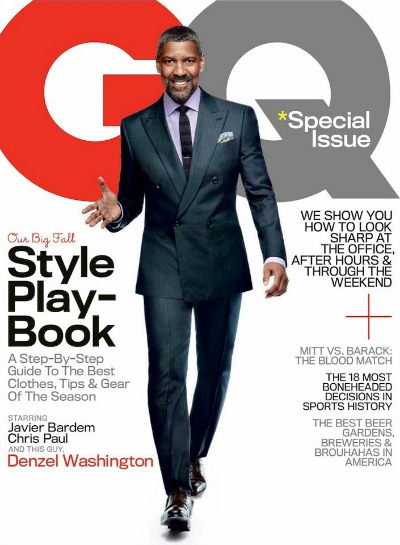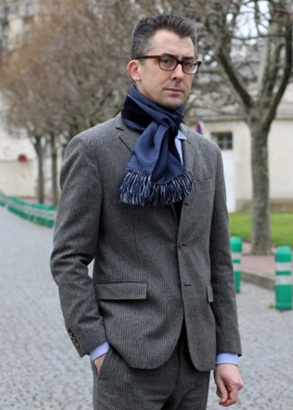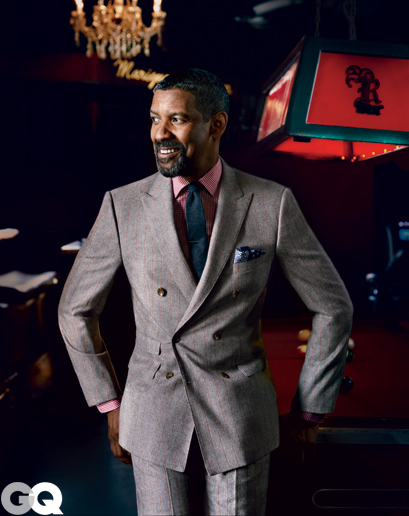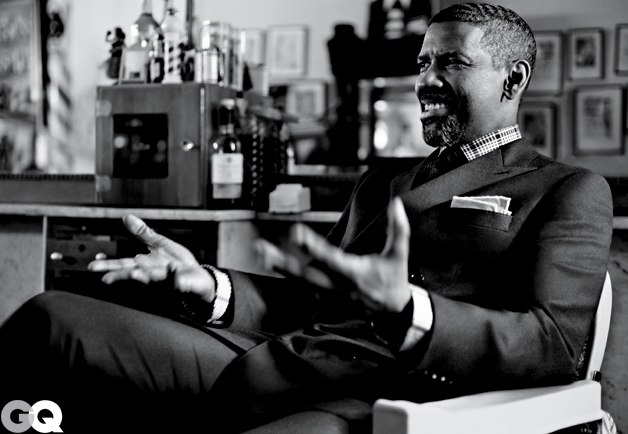 If Denzel Washington’s recent cover story in GQ magazine was his final print interview, then readers were given an extremely intimate biographical portrait of the magnetic movie star that will never be duplicated. Although Washington is the lead character in a new “Flight” flick that will be released to theaters on November 2, Michael Hainey opted not to ask the predictable questions about his upcoming film. Instead, Hainey, the longtime deputy editor at GQ, had a candid conversation with Washington where the actor discussed everything from the impact of his parent’s divorce, Whitney Houston’s untimely death, and his poignant portrayal of Malcolm X, while offering words of encouragement to black men to take responsibility for their actions and their children.
If Denzel Washington’s recent cover story in GQ magazine was his final print interview, then readers were given an extremely intimate biographical portrait of the magnetic movie star that will never be duplicated. Although Washington is the lead character in a new “Flight” flick that will be released to theaters on November 2, Michael Hainey opted not to ask the predictable questions about his upcoming film. Instead, Hainey, the longtime deputy editor at GQ, had a candid conversation with Washington where the actor discussed everything from the impact of his parent’s divorce, Whitney Houston’s untimely death, and his poignant portrayal of Malcolm X, while offering words of encouragement to black men to take responsibility for their actions and their children.
GQ’s October 2012 issue marks the second time this year that the publication has delivered a triple cover concept. Chris Paul, the dynamic point guard for the Los Angeles Clippers and Academy Award-winning actor Javier Bardem were also selected to grace the front of the men’s fashion magazine. I conversed with Hainey to discover more details from his sit-down with Washington in an undisclosed hotel in downtown New Orleans.
 Please explain your role as deputy editor at GQ.
Please explain your role as deputy editor at GQ.
I work very closely as Jim Nelson’s partner. He is the editor in chief. I basically oversee everything from the Web to the digital to working with the staff to get out the magazine every month. Wherever he wants to deploy me, that’s where I go.
How long have you been with GQ?
I’ve been with GQ for 13 years now and in this role for 10 years since Jim became editor in chief.
How did you select Denzel for the cover of your October issue?
We chose three covers for that issue featuring Denzel, Chris Paul, and Javier Bardem. We had done that previously this year for our April issue which we had done as a style special on GQ Commandments. It did very well for us and we decided to try it again in October. We picked them obviously because they are guys that appeal to a variety of ages and they are people that guys are interested in whether they are in their 20s like Chris Paul or in their 50s like Denzel. Regardless of their age, they are icons for most men.
Your interview wasn’t what many people may have expected. You didn’t delve into his latest film or discuss the plot at all. This appeared to be a retrospective look at Denzel’s legacy.
I just decided to speak more about his career and even less about his career and more about how he got there. That’s how he resonates with readers. It’s not how he made the movie but what got you there as a man and as someone who is ultimately working a job and trying to accomplish something.
There were so many amazing quotes in this piece about his perspective on Whitney Houston, his thoughts on Obama, and his hopes for black men. He even admitted to having a 1.8 GPA which should encourage lots of struggling students out there. What stood out to you during the interview?
I think you mentioned the motivational part of seeing him as a young guy in college. That’s sort of what I always try and plumb in interviews which is where these guys came from. Whether it’s Denzel or other people I’ve spoken to like Clint Eastwood or Keith Richards or Mick Jagger these guys are huge stars but they were 22 once and they were unknown and they were going through the same sort of challenges and questions that just about every guy who reads GQ goes through which is: “How do I get to where I want to get to?” With Denzel I also liked him talking about how being raised in his father’s church affected him even in roles like “Malcolm X.” The reader sees how you never leave these things behind whether you are an actor or a lawyer or a businessman. Those are things that your parents taught you and you grew up with them. They’ll influence you in positive ways if you allow them to.
Your interview with him took place in a hotel room in downtown New Orleans. How long did this take?
I saw him for two 2-hour sessions over two days. After the second session, he did the photo shoot.
 Did you also attend the photo shoot in order to get some background on his style?
Did you also attend the photo shoot in order to get some background on his style?
No, I didn’t go to the photo shoot. The fashion team is not at my interviews so I let them do their thing and I do my thing.
Those sessions seem pretty long. Is there anything that you left out of the piece that would have captivated readers?
I think you got it all. There’s some of the stuff where he goes deeper on some questions but I’m always a believer that if you make it as tight as possible it will resonate for the readers. I think it’s all there.
Do you ever get feedback from Denzel or his management?
I heard he was very happy with it as well as his team. I also got a great response from the readers who saw it online. They reached out to me through Twitter and e-mail. I think it really connected with a lot of people.
When did your actual interview with Denzel take place?
It was late July. We work three months ahead. For instance, right now we are closing up our December issue so people are reporting stories now for January and February. You have to think about a three-month lead time for anything you are doing here.
The article was very colorful and I’m sure people would have wanted to see Denzel’s body language and facial expressions during some of those sound bites. Did you ever consider recording a video interview with him and allowing readers to access it at GQ.com?
We are doing it less where I as the writer would be doing it with a camera but if you look at Javier Bardem we did a video with him and that tends to happen at the photo shoot. Usually the photographer will take him aside for 5 or 10 minutes and throw some questions at him and those videos first go on the iPad and later we put them online. They are more of what I call atmospheric video. I would love to record my interview but that becomes something like a Charlie Rose thing and we would be getting into a different sphere. Also, with a camera it changes the dynamic of a conversation. It’s more technology in the room than when I’m sitting there with just the two of us in a hotel room looking out the window. It’s just a cassette recorder between us and I think it makes it a little more intimate because you don’t see all these cameras and lights around you. It gets the subject to think differently I think.
Denzel wore an Armani and a J. Crew suit during his photo shoot but what was his style like during your interview?
Often times when you find actors on location if they are not on set they are sort of dressed very casual so he was just wearing a sweatshirt and jeans because he was waiting to go to set. They are often times not dressed like they are expecting to be photographed in the world. He had just come from filming and was pretty relaxed.
In your opinion what sets GQ apart from other fashion publications?
I think all of our competitors on the newsstand do something different and I’m glad we’ve got strong competitors. We have a voice of authority and confidence and we have a sense of wit about ourselves. We always speak to the reader in that sense and a reader who goes through the world with confidence and also the confidence to know that he doesn’t know something and then they come to GQ for that.

